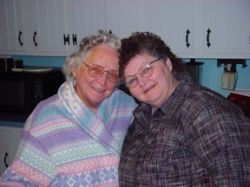Help for Caregivers

Caregiving: Love's Assignment
Caregiving is not a job most of us choose. As our family ages, it is a job that finds us. Out of love for our aging parents or spouse, and out of their need, arises this new job of caregiving. Many of the skills we used to raise our children are now put to use in a different way. Our caregiving time may be long or short, but whatever time we have left with our loved one is precious. This lens is about how to make the most of that time and be an effective caregiver.
Preparing for the Unexpected
We can never fully prepare ourselves for the challenges of caregiving. Because we don't know what the future will bring, there always may be gaps in our knowledge or events we wish we would have anticipated. But life does prepare us in many ways. Let's take a look at the ways you can help prepare yourself.
* Establish a close bond of trust with your loved one. This is something you'd want anyway! But when there are strong bonds you'll have an easier time convincing them to do things you believe are in their best interest. If there is poor communication and distrust, you may have to deal with unpleasant friction. When there is disagreement, you may have to resort to heavy-handed tactics which may make an otherwise unpleasant situation even more unpleasant.
* Have children. Maybe you already have. Raising children gives you experience with caregiving, albeit on the opposite edge of the age spectrum. You will learn to rely on doctor's expertise, deal with health challenges, and babysitters. You also will learn to take responsibility for someone else's health. As a child, you let the parent bear the responsibility. As a parent, and as an adult child, you may be asked to make life-and-death decisions on your loved one's behalf.
* While your aging parent is still self sufficient, you'll likely be asked to help out a bit here and there. If you live nearby, you can ease into your caregiving responsibilities by helping out with odd jobs, moves, shopping expeditions, emotional support and the like. Learning their likes and dislikes, where they keep things in their home, even what is their favorite grocery and drug store, can be helpful tidbits of information in their time of infirmity. It may seem like a small thing to you, but bringing in their favorite takeout dinner when they're homebound can bring a smile.
* Be sure they have a primary health care provider they trust. If they need a specialty care provider or providers, be sure they have those on board before any crisis. These medical professionals will be in a better position to provide advice they can trust if a crisis occurs. At the last minute you end up with potluck, and no matter how qualified the professional, they have not had an opportunity to earn your trust. If hospitalization is involved, hospital providers will want to return you to the care of a trusted medical professional for ongoing care.
Get the Support You Need
As a primary caregiver, you may feel very inadequate for the task at hand. Not being a nurse or a doctor, you may feel very ill equipped for this new job assignment. But know you are not alone. There are many resources, very likely in your own community, to help you.
This lens will help direct you to governmental resources in the United States that can be of great assistance.
Whatever you do, stay connected to other family members, your church, and others as you are able. Those around you may have valuable advice or training which will make your job easier. And take care of yourself. Eat properly and get the rest you need to be strong for your loved one!!
Canes from Amazon
Unsteady legs need extra support. Walls are great, but they are not always where you wish they were. Furniture may swivel and tilt, causing more problems. And even a willing arm can become strained from offering support.
So even if your loved one doesn't want a cane, they should have one if they need to grope for support! Canes are a wonderful solution for this problem. For safety's sake, it may be a good idea to purchase a cane and leave it where they can use it privately at first, becoming emotionally comfortable with the idea.
Medicare may reimburse you for your purchase, especially if you can get a prescription from the doctor. Pronged canes offer added support for weaker bodies.
Go Easy on Yourself
When your loved one is in a health crisis, you may be tempted to push yourself. You may use that extra adrenaline to stay overnight at the hospital, but you cannot expect yourself to continue this indefinitely.
You must choose carefully. Spend time with your loved one when your support is needed -- before a surgery, when you need to be sure hospital personnel are aware of the medical history and medications, when they are awake and their condition is critical. As much as you long to stay with them around the clock, you may have to go home where you stand a reasonable chance of getting some sleep. You may need to get away from the hospital room, even if it is to go to the hospital cafeteria for food and a mental break.
Don't expect yourself to be super human. What you are going through is probably tough and physically and emotionally demanding. If your loved one will come to your home after the hospitalization, you will need to be be strong to care for them.
Be sure to line up backup help. You will need to get out of the house if at all possible to buy groceries, medical equipment and supplies, and for your own sanity. Even if you just like to step into your garden and pull a few weeds, or cut a few flowers, you should pace yourself. Give yourself some time and space. Don't feel guilty. The time and space will build your endurance and strength over the long haul.
Walkers from Amazon
As your loved one requires more care, you may find it is difficult to get out and shop even for those things you need. Here are some walkers to consider when mobility is decreased.
There are advantages to both the lightweight and rolling walkers with seats. The lightweight walkers are the easiest to transport, but require more effort to use. The rolling walkers are easier to use for those who are frail, allowing them to sit and rest when needed. But the rolling walkers are heavier and bulkier to transport.
Doctors Are Allies
Your loved one's doctor is a valuable ally. Be sure to ask for his or her advice as your loved one ages. They can assist you with local referrals to home health support, Medicare reimbursements, and medical equipment.
Your loved one's doctor likely will have good advice about how to encourage your loved one to eat, keep physically active, and receive the care they need in their own homes.
Be sure to keep the primary care doctor informed of any changes in your loved one's condition. Many of their physical problems may actually be side effects to the drugs they are taking. Be sure to question the doctor when a problem arises. Ask about the possibility of side effects. The doctor may be able to recommend another drug without the side effects. Or they can authorize you to discontinue any medications which are not really necessary! It is better not just to take another medicine to cancel out the side effects of the first one...
Exercise Bikes from Amazon
Keeping those legs strong is a wise idea. Using an exercise bike can be fun -- especially if they watch a favorite television show or movie at the same time!
Home Health Care a Valuable Resource
Home health care personnel are a very important resource for the elderly. Whether they are struggling with arthritis and need encouragement to exercise, or are needing extra care after being released from the hospital, home health personnel can provide the time, attention and skill needed.
Your doctor can order home health care which would be funded through Medicare, so there is no reason not to get the help you need. Home health personnel services include nursing, giving the doctor an extra pair of eyes and ears in the home between visits. A nurse can administer a blood test at home, check blood pressure, and give much appreciated advice on patient care. A nursing visit can also uncover problems early, provide professional advice, assist with wound care, and even provide emotional support!
Home health care firms also can offer assistance with bathing, which may be important for safety's sake, and with physical therapy, including a customized exercise program and safety training.
Peddlers from Amazon
If you loved one is frail, you can help them stay active with a peddler. The stronger their legs are the safer they are on their feet -- which is a very good thing!
You may ask your doctor for a prescription in case you can receive reimbursement for a peddler.
A Word About Side Effects
Many drugs have a long list of side effects we're not inclined to read about, especially when we are busy with caregiving responsibilities. They may be scary and/or they may list possible side effects difficult to trace, like constipation. Many an elderly person suffers from constipation, with or without medication.
Remembering the potential for problems from medications can be invaluable when your loved one (or you, for that matter), are experiencing a new issue, like hearing things that aren't there. Or experiencing breathing issues in the heat. These CAN be side effects to drugs. You'll be doing your loved one and yourself a favor if you check to see if the symptom is potentially a side effect of the medicine being administered -- before you call the doctor.
Let's face it, the doctor is busy. If you red flag this possibility for him or her, you may be saving everyone some time in correctly diagnosing the problem. You may be glad you did.
Staying Sane
When your loved one is in a crisis, especially a prolonged crisis, you are under a lot of stress. It is more important than ever for you to manage that stress for your own sake.
You'll probably be short on time, but try to give yourself some private time to pray, read your Bible (especially Psalms), and do whatever it is that you normally like to do to unwind. It might be jogging, bike riding, or gardening. Maybe you like to play a musical instrument. Even a few minutes a few times a week will give you a mental break and may help you stay fit as well.
Here are some sensible strategies:
* If you are on duty with a homebound loved one, you may want to escape to the garden or yard for a few minutes while your loved one is safely napping or reading. Enjoy the beauty of your flowers, check on your fruit trees, or pull a few weeds. The fresh air and change of scenery will do you good. And they can always call out for you because you are nearby.
* Buy groceries. Instead of having someone pick up a few things for you, have them take over your duties at home and shop yourself. Grocery shopping isn't a picnic, but it is a change of a pace. Even a half-hour break is welcome.
* If there is a regular activity you really enjoy, get a backup and do it. Maybe you are on a bowling league and would like to make that Tuesday night event every week. Arrange for a sitter if your loved one's condition has stabilized.
* Keep a journal. If you like to write, you may find keeping a journal allows you to release the tension of the day.
* Read magazines or books that will distract you from your daily routine. Look for literature what will inspire, encourage and uplift.
* Stay connected to others. Keep in touch with other family members, friends, a church prayer group, or other support group. We're less apt to feel sorry for ourselves when we learn what others are going through.
* Express yourself through music. Play or sing a tune. Entertain your loved one and yourself!
More Home Care Options
Home health care offers great assistance, but you may find you still need help when Medicare is no longer willing to pay for it. It will be helpful to look into your options if long-term care in the home is anticipated.
Even if you bring your loved one into your own home, you may find it extremely beneficial to have extra help. For your own peace of mind and well-being, you may want to continue to have help with bathing your loved one and/or sitting with them periodically so you can have a much-needed break.
You may have to choose between Hospice services if your loved one is considered terminally ill, or faith-based help, help from family members or friends, and privately funded help. There may be a waiting list, especially for faith-based support groups, so it is a good idea to inquire while you still are receiving Medicare-supported assistance.
Take Time for Yourself
Open Your Hymnal
Taking quiet time to read and pray is more important than ever when you are undergoing the stress entailed in caregiving. Here is a book to nourish your spiritual side.
Open Your Hymnal: Devotions That Harmonize Scripture With Song by Denise Loock. $2.95 from Smashwords.com
Do you ever catch yourself singing a song in church without paying attention to the words? Open Your Hymnal is a collection of thirty devotions that transport the wisdom of classic hymns and gospel songs into the twenty-first century. Introduce yourself to the rich spiritual heritage that hymnals contain or gain a new perspective on songs you've sung since childhood.
Amazon Spotlight

Wide Chair May Solve Bath Problem
Ensuring your aging loved one can bathe or shower safely can be challenging when mobility decreases. When your loved one can no longer step into a tub safely, you may consider replacing the tub with a shower or hiring someone to assist with baths. But there is another option: A wide chair.
A wide chair fits securely over the edge of the tub, with legs both inside and outside the tub. Legs must rest firmly on the floor and tub bottom.
To use the chair, the elderly person sits on the chair outside the tub, then slides slowly toward the part of the seat inside the tub. Assistance may be needed lifting the elderly person's legs over the tub edge and into the tub.
Once the person is seated inside the tub, he or she may be able to bathe privately in a sitting position. If he or she is agile enough, standing with help from a handrail is an option.
Be sure to ask your doctor, pharmacist, or home health provider if you have any concerns about your loved one being able to bathe or shower safely.
A Book that Will Give You Hope
As a caregiver, we join in our loved one's struggle to regain or maintain mobility. We join them as they try to regain or maintain the freedom to do everyday tasks like shower, shave, dress, and comb their own hair. Our days may be long and tiring, but through it all, we need to take the time to encourage ourselves. We need to take time to applaud the achievements and be grateful for the gains made.
Navigating Through the Fog: The Story of Stroke Survivor and the Woman Who Loves Him" is a book that will help you do just that. It is the story of a California engineer who suffered a debilitating stroke which easily could have cost him his life. But God said "no." This is truly a love story which will reinforce your faith and demonstrate the power of love and prayer.
Encourage Your Loved One and Yourself
Your time as a caregiver can be quite challenging, so you may want to bolster their spirits and your own with some inspirational literature. You'll find lots of faith-building books at my website, along with Scripture posters and music.

About the Author
Like many caregivers, I was drafted. When my parents who had stood by me all their lives needed help, I was elected. Lacking medical training, the job seemed a bit challenging, even overwhelming at times. But I received help from doctors, nurses, home health personnel and even family members with previously unknown training and skills.
When my father became sick, I was eased into the job as my mother's main support. She did not drive so I provided the wheels, taking my parents to the doctor's office and even the hospital. I also was there for grocery trips, errands, and -- of course -- emotional support.
I didn't realize how easy that assignment was until I became my mother's primary caregiver prior to my mother's death. When she was no longer able to live alone, she came to my house and I was on duty full-time when she was not in the hospital. It was a very challenging time.
Both of my parents are gone now. I know the caregiving years were not easy, but they were precious.
Juicers from eBay
Juicers may be helpful when teeth or gums are sore, appetites wane, or when there's a need to beef up nutrients. Fresh juices also have help boost energy levels and even defeat cancer.
The single auger juices are known for their quietness. The lower rpm speeds reduce heating, leaving you with a healthier juice. I own a Samson GB 9004 multi-purpose machine that makes wheat grass and vegetable/fruit juices. It can also be used for mincing, raw soups, nut butter, fruit sorbets and more.
I tried juicing once or twice a day for several weeks and noticed a difference in my energy levels. Persistence is required for consistent results. But no matter how frequently you juice, you -- and them -- will benefit from the increased nutrient levels.
Of course the juice is better fresh squeezed, but you can make a larger batch and refrigerate for use later.
Looking Back
The caregiving years must be humbling for a parent. After all, they are used to calling the shots, being the one in the know, and the one giving. But when they are elderly and the tables are turned, they need to be able to receive.
The "child" may feel inadequate to the task at hand. He or she may lack skills that seem basic to the task: Nursing, physical therapy, dietitian, psychological, etc.
Yet the truth is, who is better equipped to step in and make decisions? That parent has trained that child, teaching them what they value in life. Teaching them about what is important to them. If anyone is to know and understand their wishes -- at a time when they may not be able to express them -- it will be that child.
As a caregiver, the cycle of life has made its full circle. The child steps in to finish the sentences of the parent, perhaps also providing food and shelter. Like the parent did years ago, the child decides when it's time to visit the doctor or go to the hospital.
Life rolls on. Love reigns. The one who is most able rises, and does. Whether they are the parent, the child, the spouse or another dear one, they step in to complete the other -- fulfilling the tasks they cannot.













